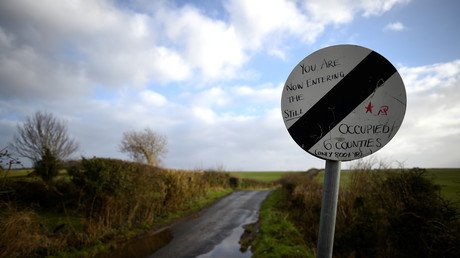United Ireland? It may not be as far off as you think

Britain’s haphazard attempt at withdrawal from the European Union has reopened the debate on the prospect of a united Ireland — and despite loud protests from some quarters, the cat can’t be put back in the bag.
The prospect of a ‘hard’ Brexit is nowhere more feared than it is on the island of Ireland. The signing of the Good Friday Agreement (GFA) in 1998 put an official end to 30 years of sectarian conflict in the north-eastern corner of Ireland and brought a fragile peace to a statelet that had been founded — and sustained for decades — on a crude sectarian headcount.
Included in the GFA was a mechanism whereby a united Ireland could be achieved at some point in the future, through separate border polls in the north and south, if at any time it appeared the appetite was there for reunification.
Today, the border between north and south is invisible — a stark contrast to the dark days when it was manned by British soldiers and became a focal point of violence during the conflict. A hard Brexit, which would see the UK leave the EU’s single market and customs union, threatens the invisibility of the border, and potentially, the peace which relies on that invisibility.
Mid-'90s Irish border community in action; the removal of divisive reinforced concrete block from "unapproved road". pic.twitter.com/GQXgmaGys5
— Daniel Collins (@DanielCollins85) March 31, 2016
A perfect storm
Talk of Irish unity has been dismissed by some as unserious and, naturally, has been outright rejected by many hardline unionists as fantasy talk. But recent months have shown that discussions of reunification are anything but fantasy.
Brexit has pushed the fast-forward button on the question of Irish unity at an interesting time, demographically. By some estimations, the North could have an overall Catholic majority by 2021 — one hundred years after partition. While most, if not all, polls to date have shown a majority in favor of remaining part of the UK, the majority is slimming. A recent YouGov poll commissioned by the BBC found 45 percent in favor of maintaining the union with Britain, 42 percent in favor of a united Ireland — and a crucial 13 percent undecided. Polls in the south show a huge majority in favor of reunification. Another found that more people in Britain rate leaving the EU higher than they do holding on to Northern Ireland.
Adding to uncertainty in the North is the fact that the power-sharing government collapsed 18 months ago after various political scandals and has not been restored since. What’s more, the Democratic Unionist party (DUP) only barely held on to its status as the largest party in the North during a snap election last year and the nationalist Sinn Féin party could very well overtake them in the next Northern Ireland Assembly elections.
The push for unity and the seemingly looming inevitability of it has even prompted unionist leaders to admit that it is a possibility for which they must prepare. Indeed, thanks to Brexit, a very small number of unionists have become more open to persuasion than ever before — and some are already full “converts” to the idea.
Economic benefit
The first retort from those in favor of the North remaining in the Union with Britain — or indeed those from the south who are concerned about the logistics — is to suggest that reunification would be economically unfeasible. But those who have seriously examined the economics of reunification have reached the opposite conclusion.
A recent study undertaken by Gunther Thumann, a senior IMF economist during German reunification and Irish senator Mark Daly, found that Northern Ireland — the region set to be hit the hardest from Brexit and which voted to remain in the EU — would have a near-balanced budget in a state of reunification. That is before even taking into account the potential economic growth that reunification could unlock for what has been a historically neglected region in terms of investment. In 2015, a US study found that unification could deliver a potential €36.5 billion GDP boost within the first eight years.
Those attempting to pour cold water on notions of Irish unity often bring up the figure of £9.2 billion — the Northern Ireland deficit in 2014. But the report from Thumann and Daly argues that this is “not a meaningful measure” to be working from, because it contains “expenditure items which would not be present under a unification scenario” including “British military spending attributed by the UK Treasury to Northern Ireland as well as reduced public service and pension expenditure.” Those adjustments, the report said, would move the fiscal accounts “substantially towards equilibrium.”
A third study, this one by economics journalist Paul Gosling and journalist Pat McArt, suggested that a united Ireland would be economically stronger and noted that it costs London more annually to hold on to Northern Ireland (£9.2 billion) than it does to be part of the EU (£8.1 billion).
Gosling argues that in the event of a united Ireland, the EU will help with restructuring costs in much the same way it did during the reunification of Germany. Gosling also explains that Britain would remain responsible for pension liabilities since the population in the North has been paying into UK state and occupational pensions. That kind of arrangement with London, he says, would last until roughly 2050.
These three studies taken together should give pause to anyone who wants to dismiss the notion of Irish unity out of hand based on economics alone.
Brian Feeney on the economics of unification. If you haven't read @PaulGosling1 report, you should. pic.twitter.com/bXr7FwfnSL
— Patricia Mac Bride (@IRLPatricia) August 8, 2018
None of this is to suggest, however, that a unity project would be plain sailing. Serious hurdles remain for nationalists looking to win a border poll. One of those is the heavily-criticized health service in the south, which is typically pointed to in the North as a stumbling block to unification. This is not to even mention the social and cultural hurdles which would need to be overcome for a new Ireland to succeed. Sectarian attacks are sadly not yet confined to history and the North is still a hugely culturally divided place.
An ‘agreed’ Ireland
It is sometimes suggested that Ireland must wait for the ‘right time’ to hold the border polls; a time when it will be less ‘divisive’. The reality is, there will likely never be a time when a border poll will not be divisive. Whenever it happens, it will be a bitterly fought campaign — but that doesn’t mean it can or should be avoided forever.
When Irish Republicans talk about a unified Ireland, they tend to talk about an ‘agreed’ Ireland, whereby we maximise consent around as many contentious issues as possible in both communities, unionist and nationalist, before reunification. This is important and much work needs to be done to build trust and consensus around what a united Ireland might look like and how it can work for everyone.
But Kevin Meagher, who has authored a book on the ‘inevitability’ of a united Ireland, recently pointed out that while this ‘agreed’ Ireland might be preferable, it is not a precondition. The base requirement is that 50 percent + 1 vote in favor of reunification in polls north and south. There have been some attempts recently to move the goalposts, to say that a 50 percent + 1 outcome would not be decisive enough to secure constitutional change. But, as Meagher wrote, there is no provision in the GFA for any kind of supermajority, and “if 52% is enough to eject the UK from the EU, or 50.5% is enough to see the creation of the Welsh assembly” then a numerical majority must be enough for a united Ireland.
It’s often been remarked that the government in London has never been overly concerned with the happenings in Northern Ireland; that the people and politics there are foreign to them and that Belfast is just bit of an annoying sideshow. That was made abundantly clear when Boris Johnson nonchalantly wondered aloud why there was so much fuss being made over the Irish border.
Indeed, the lack of knowledge displayed by British politicians over the border issue has been astounding. In 2015, before the Brexit vote, one former British conservative MEP said on Twitter that it was “silliest” thing for anyone to suggest that a hard border would be imposed “after 94 years” without one. He was quickly schooled by more historically-aware Twitter users who reminded him that there had in fact been a hard border in Ireland.
At Deltapoll, we asked Leave voters in Britain to choose between leaving the #EU and peace in #NorthernIreland. Nearly 6 out of 10 said the UK leaving the EU was more important. #Brexitpic.twitter.com/0FqMJAJZgN
— Joe Twyman (@JoeTwyman) July 31, 2018
But perhaps the best example of British indifference to the North is the fact that in the midst of all this Brexit border drama, the London government reportedly asked the Dublin government to “ease off” on its emphasis on maintaining peace in the region. Sadly, this kind of thinking is not confined to Theresa May’s government. Asked if “only one” were possible, peace in the North or Brexit, a recent poll showed that six out of ten ‘leave’ voters said that Brexit was more important than peace.
It’s important to make clear that when people say a united Ireland is on the cards again, next to no one means it is coming around the next immediate bend. But politically, socially and economically, it is hard to deny that the partition of Ireland has been a failure — and that unity may be the best solution.
Like this story? Share it with a friend!
The statements, views and opinions expressed in this column are solely those of the author and do not necessarily represent those of RT.
















